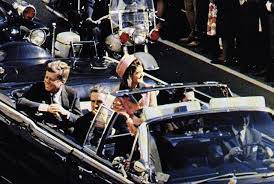Wednesday
Sixty years ago, on the day that JFK was shot, I was in seventh grade in Sewanee Public School. While our classroom did not have a television, the sixth grade classroom did so I remember a number of classmates going over to watch the events although I don’t believe that I did. But I remember school being canceled the following day and experiencing a strange sense of stillness in the air.
Then the world got even crazier as the killer was himself shot. I think I heard that news when I got out of church, and it conveyed to me, even more than the assassination, that the world outside my safe enclave was chaotic and out of control. While it’s not like my childhood ended that day, something definitely shifted.
Something shifted for poet Lucille Clifton as well. In “november 21, 1988,” she finds herself, 25 years later, looking back and feeling that history that day became divided into a “before” and an “after.” “Before” was a time when “honor was honorable and/ good and right were good and right.” “After” was “the bubble clos[ing] over the top of the world.”
I interpret the bubble as a closing in. A sense of infinite possibility has given way to the grim reality of limited prospects. Until the moment in November, hope was in the air. August of that year had seen Martin Luther King’s “I have a dream speech.” And even though, a month later (in September), racists bombed a Birmingham church, killing four little girls, that was in reaction to a trajectory that seemed to be trending upwards.
Clifton would have been 27 at the time of the Kennedy killing, probably a young mother. I think she sensed, in a visceral way, that the forces of reaction would do anything to forestall “liberty and justice for all,” even if the president had to be killed to ensure it. (With today’s rightwing willing to tolerate a coup and Trump’s violent rhetoric, we’re much clearer about that now.) In 1988, when she wrote the poem, Ronald Reagan and the GOP were doing all they could to roll back the gains achieved by the civil rights, labor, and feminist movements. Also in the late 1980s, urban crime was soaring with the crack epidemic, talented young men were dying in the thousands from A.I.D.S., and wealthy Americans were making out like bandits. From that perspective, “this” was “not better than that.”
In short, “november 21, 1988” is a “good old days” poem. Or as Clifton puts it, “them days.”
november 21, 1988
25 years
By Lucille Clifton
those days
before the brain blew back
mottled and rusting against the pink coat
them days
when the word had meaning
as well as definition
those days
when honor was honorable and
good and right were good and right
them days
when the spirit of hope
reached toward us waving a wide hand
and smiling toward us. Yes
those days
them days
the days
before the bubble closed
over the top of the world. Not
this is not better than that


